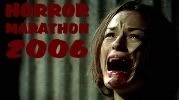Aguirre, the Wrath of God (1972)
 Aguirre, the Wrath of God opens with a lightly image whose potency steadily accrues as the sheer scope of it all sets in: a band of humans slowly descending the steep terrain of a fog-shrouded mountainside, so miniscule amongst the landscape that they appear not unlike a line of ants. So too does the entire film feel the impossible weight of the natural world bearing down upon the fragility of mankind, who dares to suggest that he can conquer it and claim it as his own. Less of a criticism of imperialism than a somber, hypnotic mood piece that absorbs, digests, and regurgitates the vanity of mankind’s conquering spirit, Aguirre creeps into the psyche like an anesthetic through an IV tube. It may be the most hauntingly ethereal film even made.
Aguirre, the Wrath of God opens with a lightly image whose potency steadily accrues as the sheer scope of it all sets in: a band of humans slowly descending the steep terrain of a fog-shrouded mountainside, so miniscule amongst the landscape that they appear not unlike a line of ants. So too does the entire film feel the impossible weight of the natural world bearing down upon the fragility of mankind, who dares to suggest that he can conquer it and claim it as his own. Less of a criticism of imperialism than a somber, hypnotic mood piece that absorbs, digests, and regurgitates the vanity of mankind’s conquering spirit, Aguirre creeps into the psyche like an anesthetic through an IV tube. It may be the most hauntingly ethereal film even made.Herzog’s camera exists as an almost weightless presence amongst the events of the film, its detached observation at times reflecting the slowly degenerating sanity of its human subjects. This is largely aided by the on-location shooting, typical for Herzog, whose thematic fascination with impossible dreams and grand aspirations was often paralleled in his own cinematic endeavors (none more breathtaking than the physical centerpiece to his masterwork Fitzcarraldo). Here, his subject is the fictitious expedition led by Gonzalo Pizarro, which traveled into the Peruvian jungle in the 17th century in search of the city of gold, El Dorado, a legend forged by the natives they persecuted so as to thwart their conqueror’s efforts. In the uncivilized jungle, they wage a hopeless fight against the elements, prompting Pizarro to send a smaller team of men and slaves downriver to find the mythical city. If they do not return within a week, then the search will be assumed lost.
This sub-mission unravels quickly; one of the three rafts is irretrievably caught in a whirlpool, and the tide of the river takes away the remaining rafts during the night while all sleep on shore. Second in command, Don Lupe de Aguirre (Klaus Kinski), sees fame and riches at stake, and successfully mutinies against the leader, Don Pedro de Ursua (Ruy Guerra), when he chooses to abandon the mission and return to Pizarro. The remaining episodes of the journey are nary different than those beforehand, only in that their fruitlessness becomes increasingly more obvious. Having declared rebellion against the crown, Aguirre nominates and crowns a king to represent their new nation – robe, throne and all. Mankind’s rituals are desperately pathetic amidst the amoral and unforgiving jungle.
Aguirre exists somewhere between the role of a journeyman on the doomed expedition and a celestial presence existing outside of the unfolding events, the latter largely bolstered by the unique, nearly indescribable score contributed by the German band Popol Vuh (frequent collaborators with Herzog, music often being an integral part to the earthly vigor of his films); rousing choral chants are mixed and layered so as to suggest angels falling from heaven to earth. As Aguirre, Kinski delivers a performance so transfixing and penetrating that one must wonder if he’s really acting at all (the film’s legendary on-location production, which eventually led to threats of murder and suicide between the actor and director, suggests that such is far from unlikely). The low-budget production incidentally befits the material: the sound recorded on the raw footage was so poor in quality as to prove completely useless, forcing the entire soundtrack to be remixed in post-production, the dubbing and subtly unnatural audio adding to the hallucinatory, otherworldly effect projected upon the viewer. The experience of Aguirre is like a slowly disitengrating connection with reality.
The cumulative, overwhelming sense of Aguirre is of inescapable death, as both a part of the natural order and a horrifying destination, the course of which cannot be veered from. With delusions of grandeur and a totalitarian reign, Aguirre drives his expedition into the ground and then some, the silent arrows and poison darts lobbed by the native population feeling less and less like a mortal danger than a spiritual release through the demise of the flesh. Fever and hunger take their toll, the meditative images unbound to narrative and relentless in their trance-like persuasion. The final scenes see Aguirre marching across his raft, amongst the dead and dying, his failed civilization drifting hopelessly down the river, overrun by hundreds of tiny monkeys, like some sort of pathetic miracle. It is the effortlessly towering ending to a soulful, harrowing masterpiece.





